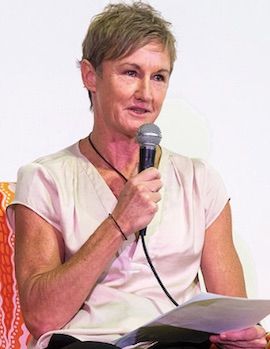Mother of girl 'denied education' contacts Children's Commissioner
23 April 2017

 By ERWIN CHLANDA
By ERWIN CHLANDA
Neither Education Minister Eva Lawler (at right) nor Families Minister Dale Wakefield (at left) will comment on the denial of education to a six-year-old girl, Santanya Namatjira, alleged by members of her family and friends.
They say the girl, who lives in the bush community of Wilora, has on several occasions been prevented by the principal from coming to school.
Neither Ms Lawler nor Ms Wakefield will be interviewed on the issues. Nor will any further information be provided by the department. And Ms Lawler’s media minder has made it clear that the school principal at centre of the scandal, Marita Mckenzie, is not permitted to be interviewed.
It has now been revealed that the child’s mother, Sally Namatjira, has made a complaint to the Children’s Commissioner, Colleen Gwynne.
And a former youth worker at the community, Marie Rosa Rodner, has told the Alice Springs News Online about her confrontation in 2015 with Ms Mckenzie over what she sees as hardline attitudes towards young people in the community and challenges to her authority.
 Ms Namatjira was assisted in formulating her complaint to the Children’s Commissioner (at left) by a person who spoke to the News on the condition of not being named.
Ms Namatjira was assisted in formulating her complaint to the Children’s Commissioner (at left) by a person who spoke to the News on the condition of not being named.
That person says the letter contained the following complaints and information:-
The principal waits for Santanya to turn up at school, then talks to her like a dog and tells her to go home.
Two officers from the Department of Families had a meeting with Ms Mckenzie, asking if Santanya could use the school playground while the meeting was in progress, but that was denied, with Ms Mckenzie yelling it was her duty of care and Santanya had to go home.
Ms Mckenzie raised her voice at the meeting so many times that Santanya got frightened. The Department of Families officers told Ms Namatjira to go home because of Ms Mckenzie’s yelling.
The two officers stayed to make a plan. They came to see Ms Namatjira after the meeting and told her that they were not able to make a plan for Santanya (below right) to go back to school and they would go back to their office and see what they could do.
She hasn’t seen them since, but she wants them to come back and help.
According to our source, Ms Namatjira says in her letter to the commissioner she is very sad about the situation; she asks for help, because she wants her girl to go to school.
Ms Rodner said in a written statement to her employer at the time that the clash with Ms Mckenzie was about “children and teenagers who do not attend school regularly (truants), being allowed to participate in the Youth Sports and Recreation P rogram”.
rogram”.
Ms Rodner was working in the region north of Alice Springs as a sports and recreation worker, visiting Wilora once or twice a week. She is now doing similar work for another employer.
She says Ms Mckenzie had told her “that at the school they had a strong policy against truancy, and that she expected Youth Sports and Rec (as Youth and Communities was formerly known) to not allow children who had not gone to school, to participate in the activities of Youth Sports and Rec, particularly visits to waterholes”.
In her account of the clash with Ms Mckenzie she wrote in part: “I was not in favour of excluding children and teenagers from participating in Sports and Recreational activities as I considered it would further marginalise them from school or other positive community activities, and possibly lead to antisocial behaviour.
“I said I consider the Youth Sports and Rec program is a way of diverting children and teenagers from unsuitable and dangerous activities.”
Ms Mckenzie “seemed annoyed with my position regarding the role of Youth Sports and Rec.
“She said that she had to live in the community and that people of the community (had or would, I cannot remember which of the two) come banging on her door demanding why truants were allowed to go to waterholes.
“She then said that she had a lot of work just managing to get children at level on literacy and numeracy.
“I asked her if she had any special programs for children with learning difficulties.
“This seemed to annoy her even more (it was not my intention, I was trying to change the subject to deflect from the previous topic), and she did not answer my question.
“She then told me I was not welcome through this door (pointing at the school entrance) at which point I said good bye to her and the children, and left.”
Ms Rodner says the only reason for going public is to “provide some support to the child’s situation”.



So it seems as though this principal makes a point of utilizing a power over attitude with community members.
It also appears that now we have found out some of the rest of the story behind the story of the poor little six year old girl not being allowed to attend the school.
It seems as though the principal wants to contol everything that happens in the community.
It’s a hard job dealing with kids and parents in this situation and the circumstances surrounding them.
One side of the story and I’m sure it has been juiced up from their point of view to gain sympathy.
I have a feeling that there is a lot more to the story and both sides are probably as bad as each other.
But hey if we parents managed to get our kids to school everyday and encourage their development these kind of things would most likely never happen.
By your judgement it does @ Outraged.
To me it seems like the principle is simply saying that attending these sport and rec activities is a reward for attending school.
Don’t go to school, don’t enjoy the fun trips. It’s a case of dammed if you do and dammed if you don’t.
The other parents (people of the community) seem to agree withy the principle’s stance.
If this principle allows the truants to attend, against the communities’ wishes, it can only lead to the other students playing truant as well.
Be careful with your criticisms, otherwise there will be nobody left to fill these roles in remote communities. As you are eager to criticize in not only this, but the previous report, how much time are you willing to invest to be the personal carer for this girl at school?
Well so there we are Ray and old mate, think it is OK for a six year old to be told to go home from school by the principal every day and to be spoken to like a dog. Good on you both!
Youth Sports and Rec staff taking truant children out to a waterhole, treating them to a barbecue.
Kids attending school miss out.
School children absent from school as soon as the Youth Sports and Rec staff arrive in the community.
They don’t want to miss out.
Discussion with the Youth Sports and Rec staff goes nowhere, they need to show the their programs is working and that means dragging kids out of school if they have to.
Every remote school principal knows what I am talking about.
The Wilora principal Marita Mckenzie stood up to them.
About time someone did.
So John, the school has a problem with sport and rec and takes it out on a six year old. That sounds fair. Not.
There are remote schools (e.g. Yuendumu) with a No School, No Pool policy that links school attendance (and engagement) to after school recreational activities.
Kids who attend school for the whole day are issued with a pool pass as they leave in the afternoon. If kids don’t have that pass, there’s no entry to the local pool on that day.
‘Outraged’ appears to be only hearing / reading what they want to hear.
I think you need to read my comments again, Outraged, I didn’t say anything of the sort. Stop trying to make the situation worse by fanning the flames.
Phil Walcott, Posted April 25, 2017 at 3:02 pm, is correct about Yuendumu having a no school no pool rule.
On the other hand, Wilora and more than 40 other remote communities in central Australia don’t have pools, so their schools can’t play that card. (The only other remote communities around here that have functioning pools are Kintore, Mutitjulu, Areyonga and (maybe) Santa Teresa).
Governments and shire councils do not support communities to obtain swimming pools, because of the high management, operational and maintenance costs associated with pools.
It needs to be acknowledged that the only way for a people to thrive is to better their knowledge and skills in which the greater community they live.
This doesn’t mean forgetting their history or culture just accepting that civilisation / cultures must evolve in order to thrive otherwise you will slowly disappear and only be spoken about in books.
The white man’s culture was to own slaves at one time (which wasn’t a new thing as the concept was around well before the white man came around).
They evolved for the better and outlawed it. Change = Betterment.
Failure to accept necessary change (for the good of your people) and hatred won’t better your life, it will do the opposite.
Much more needs to be done in communities to help but this needs to be acknowledged.
And like always not everyone needs to agree with my words it’s just my point of view and everyone has one.
More discussion can only be a good thing.